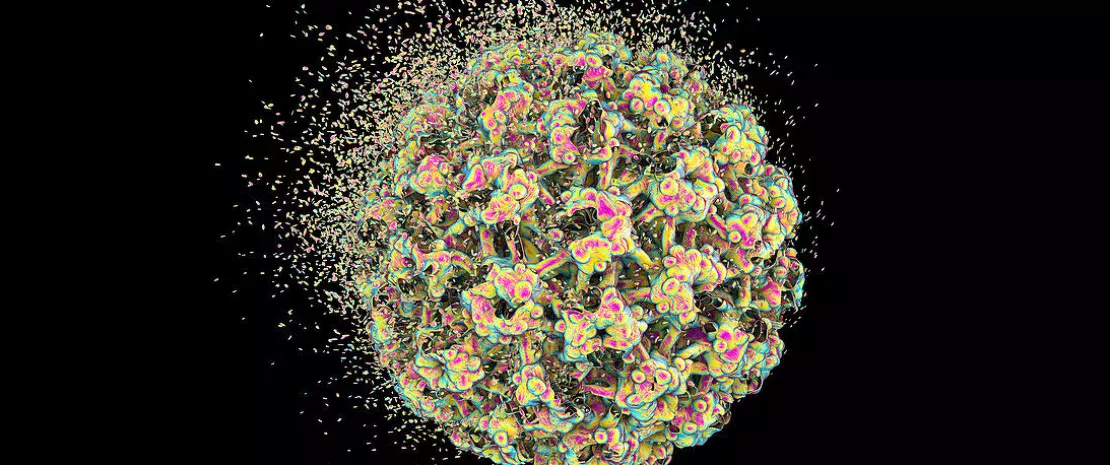Cervical cancer: the walls are closing in on L. iners
According to a Chinese longitudinal study, a higher relative abundance of L. iners bacteria in the vagina reduces the chances of human papillomavirus (HPV) being cleared spontaneously twelve months after infection. This potential therapeutic target merits further exploration as part of the fight against cervical cancer.
Lay public section
Find here your dedicated section
Sources
This article is based on scientific information

About this article
Sexual infection by a human papillomavirus (HPV) is common and is usually transitory, disappearing within 24 months in 80% of cases. However, for one in five women infection persists. High-risk human papillomavirus (HR-HPV) is the leading cause of cervical cancer. Sexual activity, smoking, and oral contraception are among the many factors that influence initial infection, the resolution or the onset of HR-HPV, and potential progression to cancer. In recent years, the vaginal microbiota has been added to this list. The value of this study is therefore clear, since it monitored the cervical microbiota of HR-HPV infected Chinese women presenting histologically confirmed, and mostly low-grade, cervical lesions.
More L. iners, less spontaneous clearance
A 16S rRNA analysis of the microbiota of the 73 participants in the study (aged between 24 and 68 years) showed that HPV had disappeared in 45 of the women (61.6%) by the end of the twelve-month study period. The clearance or otherwise of the virus was not due to differences in the patients’ age, the stage of the disease, the HPV subtype, the (sidenote: Community state types Five types of vaginal community have been identified, four dominated by lactobacilli (Lactobacillus crispatus, L. gasseri, L. iners, and L. jensenii) and a fifth characterized by a low lactobacilli content. ) , or vaginal microbiota diversity. Instead, certain bacterial species seem to be involved: women depleted in enterococcus ASV_62 and enriched in Lactobacillus iners at baseline were less likely to have HPV-HR clearance at month twelve. The only exception was 22 women who underwent surgical treatment (conization) for high-grade lesions, perhaps because the immediate impact of lesion resection on HPV clearance masked the impact of the flora.
99 % of all cervical cancer cases are linked to infection with papillomavirus, an extremely common virus transmitted through sexual contact.
4th Cervical cancer is the fourth most common cancer in women.
570,000 women In 2018, an estimated 570,000 women were diagnosed with cervical cancer worldwide and about 311,000 women died from the disease.
Sources: WHO.
One more finger pointing at L. iners
A possible link between L. iners and HR-HPV had previously been reported by a meta-analysis suggesting a two- or even three-fold higher risk of persistent HR-HPV when the vaginal microbiota is dominated by L. iners. This bacterium appears to be both flexible and adaptable, dominating the vaginal microbiota of certain women during menstruation or episodes of bacterial vaginosis. On the other hand, a vaginal microbiota dominated by L. iners (CST III) is frequently reported as one of the most common types of vaginal bacterial community among Asian child-bearing age women. Therefore, it is not yet clear from the current literature whether this particular strain of Lactobacillus should be considered beneficial, pathogenic, or both. Further work is also needed to clarify the mechanisms by which L. iners promotes persistent HPV infection or lesion progression, especially since the current study involved a small number of patients, certain confounding factors, such as smoking, were not taken into account, and it lasted only one year, whereas a 24-month follow-up is required.
Shi W, Zhu H, Yuan L et al. Vaginal microbiota and HPV clearance: A longitudinal study. Front Oncol. 2022 Oct 24;12:955150.











